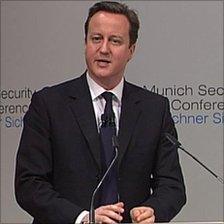Row over David Cameron multiculturalism speech timing
- Published

Mr Cameron signalled a tougher stance on groups promoting Islamist extremism
The foreign secretary has defended the timing of David Cameron's comments on multiculturalism - which coincided with a march by the English Defence League.
In Saturday's Mirror, Labour's Sadiq Khan accused the PM of effectively "writing propaganda for the EDL".
William Hague said a PM's speech should not be shelved "because some people have chosen to march down a street".
Labour's Yvette Cooper said the PM was "unwise" not to have also criticised the EDL and "non-violent extremism".
In his speech on radicalisation and terrorism on Saturday, Mr Cameron warned that the "hands-off tolerance" of unacceptable practices by non-white communities had only served to encourage extremism.
He criticised "state multiculturalism" and argued the UK needed a stronger national identity to stop people turning to extremism.
The English Defence League, which has been accused of Islamophobia - also held a rally in Luton on Saturday, prompting criticisms from some Labour MPs about the timing of Mr Cameron's speech. The EDL's leaders deny the group is racist.
'Will endure'
Asked whether the timing of the speech had been unfortunate, Foreign Secretary Mr Hague told BBC One's Andrew Marr Show: "This is a prime minister giving a speech about the future of our country, that doesn't have to be re-scheduled because some people have chosen to march down a street that particular day.
"This is a speech that will endure over the months and years long after people have forgotten what was going on on that particular Saturday afternoon."
But shadow justice secretary Sadiq Khan reportedly told the Mirror newspaper, external that Mr Cameron was "writing propaganda" for the group - a remark criticised by the Conservatives as a "smear".
Asked whether Mr Khan had been right to make the remark, Ms Cooper told Sky News: "I think that we have always got to fight against extremism, it's also right to challenge non-violent extremism as well.
"I do think the prime minister was unwise not to make it clearer that he was criticising all kinds of extremism and so on the day of course that we had the English Defence League march he could have made it clearer that he was criticising extremism among EDL members."
Asked whether Mr Khan should apologise for his comments, shadow foreign secretary Douglas Alexander told BBC1's Politics Show: "I'm pretty sceptical about politicians calling for other politicians to apologise.
"My sense is Sadiq's remarks reflected some of the rather lurid headlines that we saw yesterday about the speech."
He added that it was for Mr Khan to "explain the context in which he made those remarks".
Discrimination battle
On BBC One's Andrew Marr show, the chairman of the Equalities and Human Rights Commission Trevor Phillips refused to criticise Mr Cameron's claim that multiculturalism had failed.
He said Mr Cameron "may have made life a bit more difficult for himself" by combining a speech on terrorism with one on integration but said he was right to say it was not the role of government to tell people to embrace multiculturalism.
The Chair of the Equalities and Human Rights Commission, Trevor Phillips, says he partly agrees with Prime Minister David Cameron's criticisms of "state multiculturalism."
However he added: "People don't choose not to integrate mostly. There are a few people on the edges who don't want to integrate with anybody else but most people, if they don't mix, it's because they don't have the choice."
He said the government had a role to play to help people integrate - with a renewed battle against discrimination and work to ensure more jobs were accessible to people from all backgrounds.
He added: "The key thing here is that if you take the biggest Muslim community, Pakistanis, 25% of Pakistani men are taxi drivers, 75% of Pakistani and Bangladeshi women are economically inactive. That is the issue.
"The issue here is not some sort of abstract culture. The place most people integrate is in the workplace. If people can't get jobs, you can't expect them to integrate."
Mr Cameron's speech was criticised by some Muslim groups - the Muslim Council of Great Britain said it was "disappointing" and treated the Muslim community as "part of the problem as opposed to part of the solution."
- Published5 February 2011
- Published5 February 2011
- Published20 January 2011